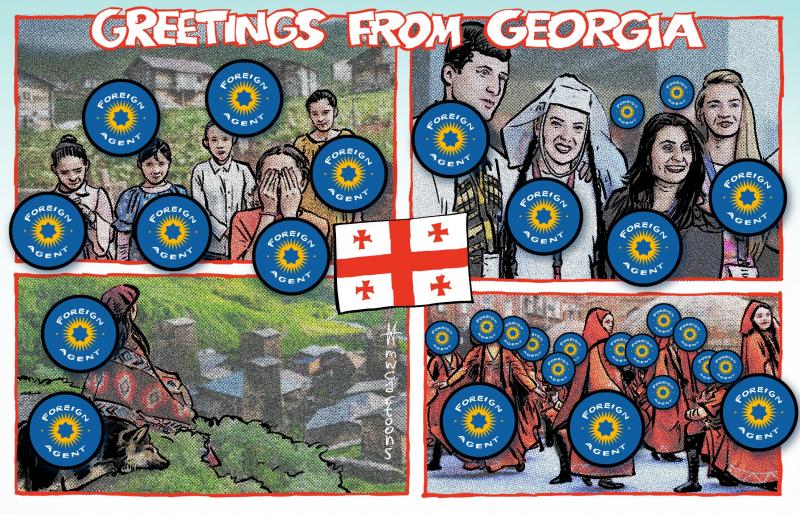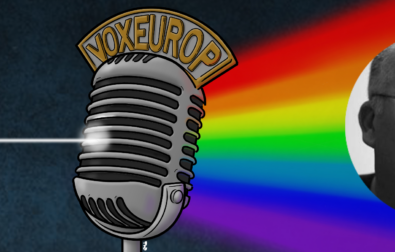A year after violent demonstrations forced the pro-Russian government to withdraw a controversial bill inspired by the Kremlin, the Georgian parliament is poised to pass a similar text. This has led to massive protests in Tbilisi and other cities against a measure seen as inspired by a 2012 Russian law used by the Kremlin to crack down on civil society.
But while the proposed bill in March 2023 concerned local and international observers for its embedded anti-democratic challenge, this time, the anticipation of a devastating threat to the state of Georgian democracy is discussed with consideration of the following factors: firstly, in December 2023, Georgia was granted the candidacy status to the membership of the European Union despite the European Commission's evaluation that the Georgian government had not met the most of the preconditions set by the EU. While renewing the hopes of pro-Western society, this background also contributed to Georgian Dream (GD, the ruling pro-Russian party)'s leverage to justify its "towards Europe, with dignity" slogan.
Secondly, if last year the draft law was initiated by the party’s breakaway group of anti-Western MPs, this time the Law was sponsored and openly backed by the GD itself, marking the new era of openly anti-Western stance officially supported by the governing party in the country. Soon after, six months before the crucial Parliamentary elections, the oligarch and GD leader Bidzina Ivanishvili publicly justified the reorientation of Georgia's foreign policy from the West.
What is up in the Georgian Parliament?
On 3 April, GD's parliamentary majority leader, Mamuka Mdinaradze, announced the reintroducing of the same Russian-style draft law. The only, yet narratively emphasized, difference between the proposed bill and the one that GD was pressured to vote down last year after the protests is that "foreign agent" has been removed from the title and replaced with a vague phrase –"foreign influence." Notably, the public and political discussions still use the word "agent" as a key term.
The same bill under a different name is still very similar to the Russian "foreign agents" legislation, which the Kremlin has instrumentalised to suppress Russian civil society over the last decade. According to the bill, any legal entity receiving more than 20 percent of its finances from a "foreign power" should be registered as an "organisation pursuing the interests of a foreign power" or pay heavy sanctions as fines.
The bill has already passed on two readings, characterized by the blatant disregard of the procedural rules and abuse of those rules to deny the opposition the right to engage in any deliberation around the Law meaningfully. Many opposition MPs and the representatives of the CSOs and media organisations were thrown out of the hearings, and the online media wasn't allowed inside the Parliament building. The third and last reading is expected to be finalized in the week of 13 May.
The last directly elected president of Georgia, Salome Zurabishvili, who in 2018 was endorsed by the Georgian Dream itself and by now is estranged from the ruling party, has promised to veto the Law. While it's important as a political statement, we should also note that the GD has a sufficient parliamentary majority to overturn her veto. Zurabishvili has declared that the main problem in Georgia "is not a Russian law, but rather a Russian government."
How does it undermine Georgian Democracy?
Notably, while the bill is discussed as an effort towards "transparency" by the GD officials, its 8th point is particularly worrisome for the gatekeepers of Georgian democracy. According to this clause, the government can inspect and search those organisations based on a report from an anonymous source, effectively resurrecting a practice from the Soviet totalitarian experience. The government agencies are additionally granted power to suspend the work of the organisations and confiscate all their data. This will be especially effective against the watchdogs to prevent their work in exposing the regime's corruption and other wrongdoings.
The decision to revive the "foreign agents" bill has been met with fierce criticism both domestically and internationally. Tens of thousands of Georgians have been engaged in youth-led daily protests for the past month in the streets of Tbilisi, the capital of Georgia. The regime responded to the public outcry with the use of power, injuring many unequipped youngsters with pepper spray, tear gas, water cannons, and some even with rubber bullets (even though the MIA of Georgia denies ever using them, both the injured and bullets have been detected at the scene).
On top of the narrative attempts at delegitimizing the protests, mainly the youth, that the officials adopted since the last time this year, the series of detention of peaceful protesters only invigorated the youth protest, allegedly adding to its disciplined and solidarity-based character. Protests have spread to other major Georgian cities, such as Batumi, Kutaisi, and Telavi.
In a joint statement, more than 100 media and civil society organisations have declared that in case of the bill's adoption into Law, they will not comply with the requirement to register as an "organisation pursuing the interests of a foreign power." Due to the government's restrictions on the already shrinking advertising market, most online media outlets depend on foreign funding. If passed, the foreign agents' bill threatens the viability of many media and most of the CSOs in the country.
Georgia's strategic partners, including the US and EU, have expressed concerns amid the proposed bill. Members of the European Parliament and a bipartisan group of US senators even warned the Georgian regime of anticipated sanctions if the Law passes. These statements were met with more anti-western narratives from the Georgian Dream and its recently officially returned leader - Ivanishvili. The only foreign supporters of this bill are Dmitri Peskov, Vladimir Putin's spokesperson; Russia's foreign minister, Sergey Lavrov, foreign minister's spokesperson; Maria Zakharova, the chairman of the State Duma; Vyacheslav Volodin, the deputy secretary of the security council and the former PM and President, Dmitry Medvedev, and Russian far-right philosopher, Aleksander Dugin.
Anti-Western Manifesto of the Georgian Government
On 29 April, GD organised a massive rally in Tbilisi to support the' Russian Law,' bussing public servants and other people from all over the country to the capital. As noted by the observers, various avenues of pressure and intimidation were deployed to ensure attendance.
Bidzina Ivanishvili addressed the audience, delivering an anti-western manifesto and threatening repressions after the elections, effectively declaring a proud war against political opponents and civil society. In his lengthy speech, Ivanishvili articulated the blueprints of the Russian conspiracy theories and accentuated the GD's central conspiracy narrative of a "global party of war."
This theory has been a mainstay of the regime's propaganda since Russia's full-scale invasion of Ukraine. He stated, "NGOs and the radical opposition are acting on their behalf. Our proposed laws will expose these dark linkages." In this way, the GD actualized societal polarisation and indicated the instrumental use in its pre-election narrative. Ivanishvili doubled down with threats of repression:
"The Georgian people should decide the country's fate. After the [victory in] elections, we will issue a strict political and legal condemnation to the collective UNM [meaning NGOs and political opponents]; it will get the due punishment it deserves. They will pay for all the crimes against the Georgian people".
The honorary chairman of the Georgian Dream has also used another favourite theme of Kremlin propaganda – the protection of national sovereignty from malign Western forces encapsulated in the Russian concept of "sovereign democracy." He declared that Georgia won't be Ukraine under Vladimir Yanukovych, the president who sought refuge in Russia after being ousted by the Maidan revolution in 2013-14.
Bidzina Ivanishvili fears the Maidan, though he employs Yanukovych's playbook step by step. His latest declaration was anticipated by some but was hard to believe for many. This chosen path should be an alarming sign for the Western partners that Georgia faces the threat of Belarusisation, where political opponents are either jailed, dead, or exiled. Even though the young and brave Georgians are taking to the streets every day, its strategic partners should understand that without their help, Georgian civil society stands alone in front of the Kremlin's interests realised via local powers in the country.
For the past few days, numerous protesters and journalists got anonymous phone calls with insults; some were threatened with death and others with rape. Following those calls, the mob attacked several politicians and activists, including Gia Japaridze, a professor at the University of Georgia and the former ambassador. The attacks were conducted in the same handwriting – at the entrance of their basement.
Was this article useful? If so we are delighted!
It is freely available because we believe that the right to free and independent information is essential for democracy. But this right is not guaranteed forever, and independence comes at a cost. We need your support in order to continue publishing independent, multilingual news for all Europeans.
Discover our subscription offers and their exclusive benefits and become a member of our community now!












